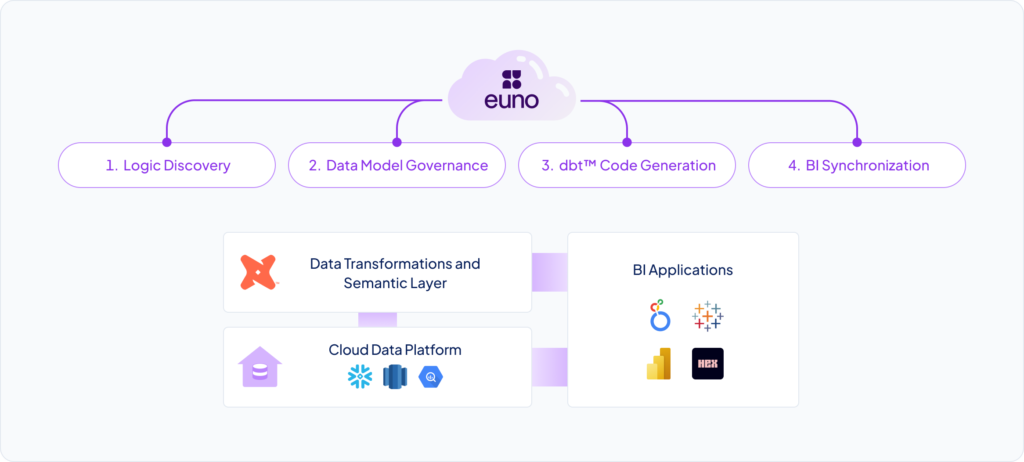Hello from Euno! Empowering data model governance for scale

You probably don’t need us to tell you that data is at the heart of every modern business’ decision making process. However, what is often overlooked is the direct impact of your central data model on the speed and credibility of the data products you deliver.
A data model is more than a technical structure; it captures the essence of your organization’s business logic – including key metrics, KPIs, and calculations. When your data teams have data models under control, your stakeholders can put their trust in data. If you let too much go, data chaos may occur.
My team and I are proud to introduce Euno, a frictionless data model governance platform. Euno offers a novel approach to dynamic data modeling that harmoniously balances the freedom of data analysts with rigorous data model governance.
What’s the problem? What do we mean by dynamic data modeling? And why choose us? Here’s everything you need to know about Euno.
The Challenge: Harmonizing Freedom and Governance in Data Modeling
Business analysts are the driving force behind making data-driven decisions, fast. The analysts’ freedom to define new business terms as they go is key to fostering innovation and adapting to dynamic business environments. Simultaneously, data teams, traditionally in charge of data governance, have the crucial role of integrating and codifying these emerging concepts into the broader data model, ensuring consistency and alignment across the organization.
The challenge becomes clear: balancing the autonomy of business analysts with the governance of consistent data models. And as organizations scale their data operation, this balance becomes increasingly complex. How do you manage data models at scale without compromising your analysts’ inventive spirit and swift delivery of data products? After all, no one wants to slow the business down.
Some prioritize business analysts’ agility, skipping some important central checks to meet business deadlines. But over time, this results in fragmented logic: redundancies, inconsistencies, data silos – a mess that ultimately burns out your trust in the data. Others might opt for extreme consistency, but this creates overhead and bottlenecks. Waiting for a centralized team to review every change can frustrate the business and bog down the central data team with countless small tasks.
Therefore, harmony depends on three things:
- Meet business analysts where they are: Let analysts leverage the tools they’ve mastered, from SQL to their preferred BI tools such as Looker and Tableau, for rapid prototyping, crafting their logic, and seamlessly promoting mature business terms to dbt.
- Automate for integrity: use automation to detect and prevent data model conflicts and duplications, ensuring quality without sacrificing speed.
- Enable collaborative dynamics: Equip data and business teams with workflows that facilitate coordination between the different roles.
Hint: Euno elegantly bridges this gap, fostering a collaborative environment where business analysts can innovate freely, and data teams can efficiently transform these new concepts into data model elements that are both consistent and reusable across the organization.
Why Dynamic Data Modeling?
Business logic doesn’t bloom behind the scenes by data engineers. It’s developed by business analysts on the front lines, as part of their everyday tasks within their native BI environments. But whatever new terms are added, from active users to churn rate, they must align with the broader structure to avoid conflicts and duplicates.
Or as we like to say: business logic is dynamic; data models must be too.
Euno acknowledges that business logic is fluid and ever-evolving. It empowers everyone, from expert data practitioners to analysts embedded in business units, to contribute actively to the development of a coherent and consistent data model. This inclusive approach is designed to prevent the data model from descending into silos, locked logic, and misalignments, such as duplicates and conflicts, ensuring it remains practical, organized, and truly aligned with the organization’s operational needs.
The integration of AI-driven analytics and advanced AI features within widely used BI tools underscores the heightened importance of data model governance even more. The ever-evolving business logic, shaped by business analysts, must be carefully coded into the data layer through swiftly governed processes. This is our best guarantee for the production of trustworthy insights driven by AI.
Enter Euno
Born from conversations with 250+ data teams, we sensed a deep frustration with how data teams struggle to foster a self-serve analytics culture as they scale. What surprised us even more was the root cause – data model governance solutions never caught up with the modern data stack: from collaboration bottlenecks and elusive inconsistencies to soaring costs.
One thing we knew for sure: we’re no match when it comes to building great teams to solve difficult problems. Eager to rewrite the script, we’ve assembled an A team of engineering and analytics pros, handpicked from the best talent around. Our mission is clear – to untangle the toughest knots for data teams and give you governance peace of mind, no matter how fast your company scales.
Leveraging Industry Standards: The Power of dbt™️
Euno serves as a pivotal tool in streamlining collaboration between central data teams and business analysts. It detects newly modeled business logic within integrated BI applications like Looker and Tableau, and guides users through the process of integrating these logical components into the shared data model (i.e. “shift left”). This includes identifying new logic, automatically generating code to capture this logic at the data layer, and synchronizing changes back to BI applications.
At the heart of Euno’s capabilities is its seamless integration with dbt (data build tool), the open-source industry standard for data model implementation. Euno provides a simple and frictionless interface that enables data teams to easily feed new business logic, originating from the analysts native environments, into dbt. This integration is key in accelerating the delivery of data products and ensures an aligned and central source of truth for an organization’s business logic.
Euno stands out with its distinctive advantage, allowing data teams not only to gain full visibility and explore data models but also to actively manage their data model calculations, descriptions, and utilization. Euno empowers data teams with automated business logic mapping across platforms, streamlining the implementation and expansion of dbt.
More than a technological advancement, Euno represents a mindset shift in data modeling. By facilitating a dynamic, collaborative, and governed approach to data model evolution, it aligns the creative insights of business analysts with the methodical expertise of data teams. This synergy leads to faster, more reliable, and more innovative data solutions, setting a dbt™️-first standard for data model governance.
Key Features of Euno
- Comprehensive Business Logic Discovery: Euno connects with BI tools such as Looker, Tableau and PowerBI. It uses sophisticated crawlers to map out business logic components, including semantic definitions and data transformations within the data warehouse,dbt, and BI tools. Euno presents this information in a unified view, enabling data teams to easily explore business logic across platforms. Key discovery tools include a column level lineage view and an intuitive catalog search.
- Shift to dbt: Data model change automation for rapid materialization. Euno recognizes new business logic elements within BI tools and guides users in integrating these elements into the shared dbt data model, allowing anyone to evolve business logic, safely. This process includes automated dbt code generation (for transformations and semantics) and bi-directional synchronization with BI tools, enabling seamless materialization to save cost and improve performance.
- A unified source of truth for your logic with a metrics layer in dbt: Euno assists teams in developing the semantic mart within dbt, by seamlessly shifting semantic definitions from their BI tools to dbt / Metricflow. It synchronizes all definitions with your BI tools for native execution and translates them into SQL. This unified approach guarantees that every user, whether executing direct SQL queries or accessing semantics via BI tools, works with consistent and aligned definitions.
- Data model consistency at scale: Euno automates user-guided guardrails and performs comprehensive consistency checks on every proposed change to the data model. It flags duplicates, conflicts, and breaches of modeling principles, ensuring alignment with organizational guidelines and maintaining a practical, consistent and organized data structure.
- Flexible integration and legacy support: Experience zero onboarding lift with Euno, designed to meet organizations at any stage of their dbt journey. Whether fully transitioned to dbt or still managing legacy logic, Euno facilitates quick setup, ensuring a smooth integration and streamlined legacy migration.

Launching Euno & The Team
Today marks the official launch of Euno (read our press release). My co-founder, Eyal Firstenberg and I bring a combined 40 years of tech and leadership experience to the table, ready to tackle some complex challenges head-on. Our paths have taken us from leading roles at Sight Diagnostics and LightCyber (acquired by Palo Alto Networks) to serving in the Israeli Defense Forces.
A heartfelt thanks goes out to all our investors who’ve placed their trust in our vision. We’ve managed to secure a $6.25 million seed round with the support from 10D VC, INT3 VC, and an outstanding lineup of angel investors. Not to mention, our advisory board is shaping up to be quite exceptional, featuring experts from the likes of Netflix to Tableau. This is just the beginning for us at Euno, and there’s a lot more we’re excited to share with you soon.
Let’s go!

Sarah Levy
Co-Founder & CEO
P.S. Check out our four use cases, maybe even schedule a demo?

.png)

